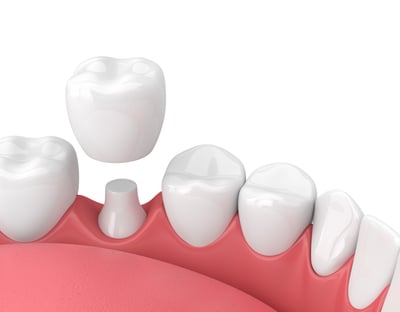Your teeth are a functional and appealing asset...until they aren't! The upside is that dental problems such as damage, decay, and discoloration can be solved.
Dental crowns could be recommended by your dentist as a go-to solution for restoring the functionality, appearance, strength, and health of your teeth.
Given that recommendation, it's a good idea to get acquainted with the treatment.
What is a dental crown?
You might occasionally hear a crown referred to as a "cap." Practically speaking, that's how a dental crown works - it provides a cap or covering over your tooth that has been damaged, decayed, or replaced as part of a particular treatment.
The structure of a dental crown creates the visible and functional portion of the treated tooth. It is designed to cover your treated area from the gum line upwards to your chewing surface.
Your dental crown can be crafted from a variety of durable materials that mimic your natural tooth.
- Porcelain
- Ceramic
- Metal alloy
- A blend of materials
These crown choices often depend on the location of your tooth that's being treated, your aesthetic preferences, and the treatment cost.
Now that you have insight into what a dental crown is, it's natural to want to know why a dental crown is necessary.
Why your dentist recommends a dental crown?
Crowns are a versatile dental treatment. That explains why they are used to restore a variety of oral health circumstances.
When your tooth is weak and requires protection
Decay or larger dental fillings can cause a tooth to weaken. These issues could worsen and cause your tooth to fracture or break off.
A dental crown placed over an affected tooth strengthens its structure with an added layer of protection and prevents further damage.
When your tooth is worn or broken
Trauma to your mouth, teeth grinding, or other damaging factors can produce problems a crown can solve.
A dental crown restores the structure, shape, appearance, and functionality of your tooth.
You can bite, chew, and smile confidently following dental crown treatment.
When you desire to cover discolored or misshapen teeth
There's a cosmetic appeal to treatment with a dental crown.
A dental crown replaces the tooth structure that's stained, has discoloration, or that has an irregular shape.
When you require support for restorative dental treatment
A dental bridge or a dental implant procedure also benefits from crown placement. These treatments are designed as replacements for a missing tooth or multiple teeth.
A dental crown provides an anchoring point to stablize a dental bridge.
A dental crown creates the new, functional tooth on top of a dental implant.
When you've had a root canal
The decay and infection that requires a root canal can also cause the treated tooth to weaken.
A dental crown provides structural support and helps prevent further tooth fractures following root canal therapy.
Understanding the compelling benefits of dental crowns, it's likely you want to know how crown treatment works.
What is involved in dental crown treatment?
Overall, a dental crown procedure isn't complicated. Be prepared for at least two dental visits following a consultation and a diagnosed treatment plan.
A dental examination and tooth preparation
Your dentist will examine the problem tooth during your first in-office visit. On occasion, x-rays, images, or scans might be necessary to assess your tooth condition or damage.
- If decay or tooth damage is present your dentist will remove it.
- Your remaining tooth structure will be reshaped to assure the proper fit of your dental crown.
Impressions taken of your tooth
After tooth preparation, a mold or impression will be taken. This step provides the lab essential details to customize the fit of your dental crown.
A temporary crown will be placed over your prepared tooth to protect it and provide daily function while your permanent crown is being crafted.
Placement and fitting of your dental crown
Your permanent crown is typically ready and delivered within one to two weeks. Following notification, you will return for an in-office appointment to have your crown placed and checked for:
- Fit
- Color
- Alignment with your natural teeth
Once these factors are approved, your permanent crown will be cemented in place. Post-placement your dentist could make minor adjustments to ensure that your bite is comfortable.
Dental crowns are a versatile restorative treatment. The treatment enables you to experience renewal in your lifestyle and appearance following tooth damage, tooth loss, or other dental restorations.
Take advantage of an easy and convenient solution for a dental consultation regarding your dental issues - including a discussion about a dental crown.
- Free scans
- Convenient, time-saving access to low cost, virtual dental consultations with a licensed dentist
- Connection to in-person dental care with dentists in your zip code
Connect with treatment solutions that restore your health, smile, and lifestyle
The Dental.com team of dental professionals are trained to identify, diagnose, and treat any dental condition. From toothaches to teeth alignment to second opinions…and tooth loss - you’re covered!
- Access a 24 hour dentist now from your personal, private, and secure account.
- Select a reason for your visit using a brief questionnaire.
- Receive virtual dental care from a licensed dentist when you provide your issue details, any photos, and/or dental/health records.
Discover more about Dental.com on our How it Works page. Or Register Now.
